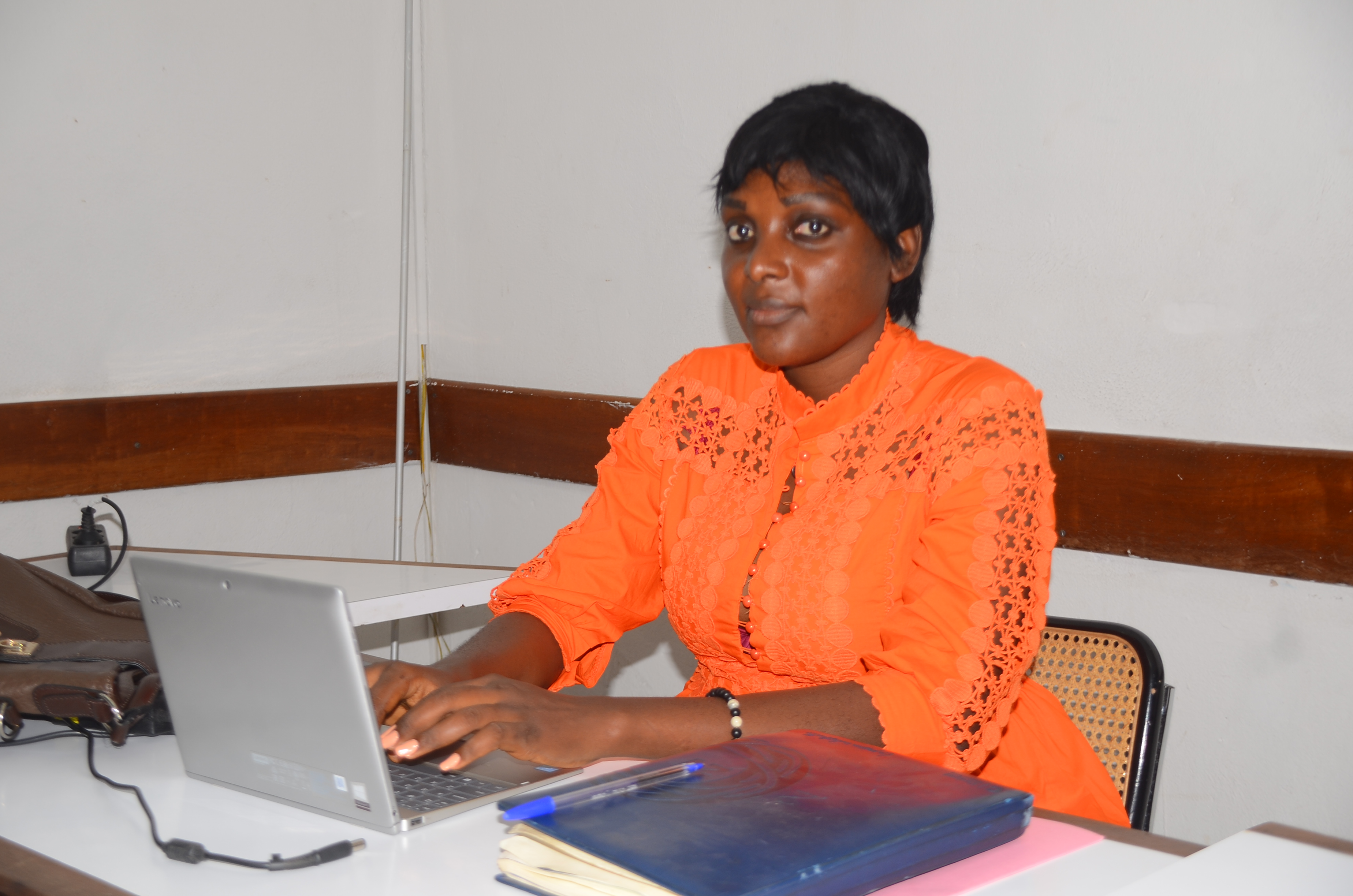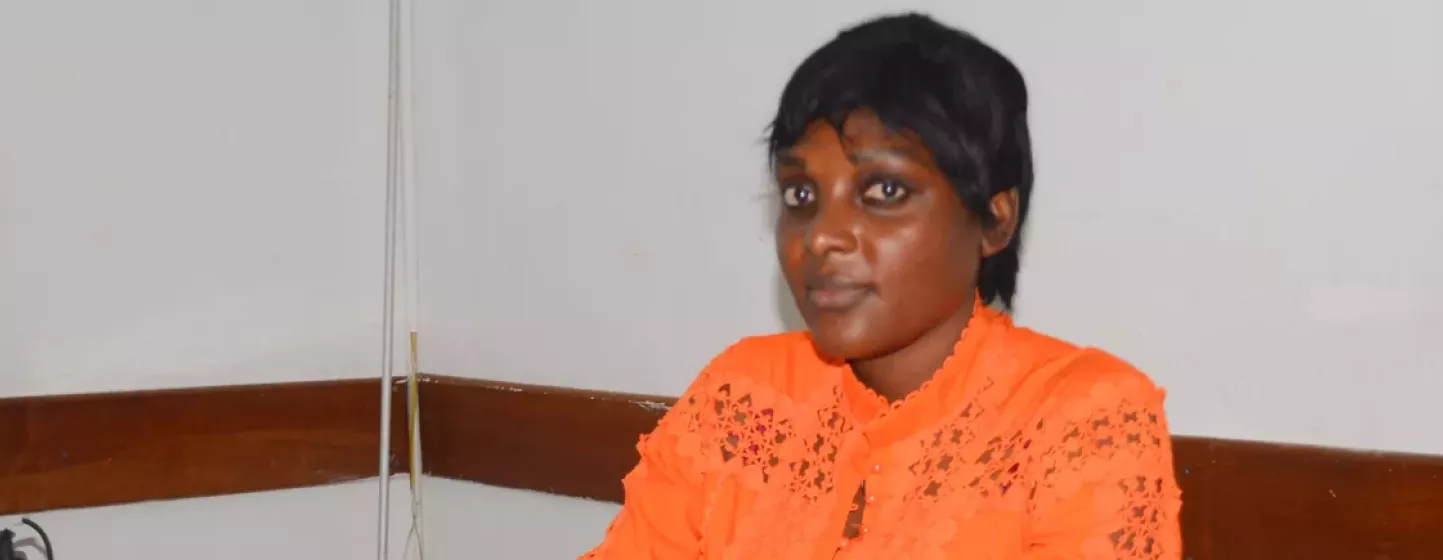Ghislaine Deudjui: the numbers speak for themselves
Ghislaine Deudjui, a 31-year-old Cameroonian journalist, specialises in economic news, health and data. In the bustling economic capital, Douala, she shines the spotlight on young entrepreneurs like her.
Profile by Emmanuel de Solère Stintzy.
As a young girl, Ghislaine Deudjui was already living an exciting life filled with activities and diverse challenges. "I didn't really play with dolls much. I preferred to spend time with the boys because they were more open to other games and, like me, they had a competitive streak!"
As the years went by, an interest started to develop: "Dad used to buy Jeune Afrique éco. I liked to look at the pictures in the magazine. At college, I joined the newspaper club. I enjoyed the freedom of being a journalist: listening, communicating, getting to know the people in front of me". Her career choice therefore came as no real surprise to her family. "We thought Ghislaine was going to become a lawyer because she wasn't afraid to speak her mind, but she likes to talk and is open-minded, so becoming a journalist was also a good choice for her!" recounts Christelle Nzitcha Digona, her younger sister.
After completing a senior technologist’s certificate (Brevet de technicien supérieur – BTS) with a journalism option, a second vocation took shape. Ghislaine Deudjui obtained a bachelor's degree in marketing and communications, followed by a master's degree in marketing and communications within organisations: "I wanted to add another string to my bow to better understand how to manage a business in the future".
In 2013, she walked through the doors of Quotidien de l'économie. Christelle Kouetcha, who was working there as a journalist at the time, remembers it as if it were yesterday: "The young Ghislaine sought me out in my editorial office. She wanted to know about the job. Even today, she still wants to innovate and to familiarise herself with new technologies in her field".
Collaborative surveys with data
Following on from this initial experience, Ghislaine has continued to build on her success, joining Le Financier d'Afrique in 2017. Jean Pépin Ndjo, a fellow journalist at this bi-weekly publication, is full of praise for Ghislaine, with whom she also previously worked at Quotidien de l'économie: "She knows how to ask for advice and to listen, two valuable qualities in an environment such as ours where everybody claims to know everything... Today, she plays a central role in our newspaper in her position as head of the Douala office. She really has her work cut out for her over there in the economic capital".
Closer to the "resourceful" people of Douala, Ghislaine Deudjui seems to be in her element: "It's important that we talk about our fragile economic situation and young entrepreneurs who are very active in the informal sector". In the coming weeks, Ghislaine is aiming to "completely overhaul" her blog to "shine the spotlight on these innovative start-ups and activities by young people". She is also convinced of the value of data: "Figures are needed to better present the data to the public.
Thanks to CFI (Editor's note: MédiaLab pour Elles [MediaLab for Women] project), I was able to work together with media colleagues with a variety of editorial lines to publish a collaborative survey with data. These collaborative surveys are less costly and more difficult to challenge. I continue to work with female colleagues in other countries to conduct surveys on cross-border issues such as corruption".

"A double-edged sword"
There is one subject that has been close to her heart for 20 years: "I lost a little sister after medical staff refused to care for her because we hadn't brought any money... I was 11 years old... I developed a hatred of hospitals as a result!" A hatred of hospitals, but not health-related subjects. Since 2017, she has been working with the magazine Échos santé. "Ghislaine is methodical and sets herself high standards. She has successfully adapted to the subject of health. Some of our partners specifically request that she writes for them as they like her style", explains Joseph Mbeng Boum, CEO of the Échos santé group.
However, Ghislaine Deudjui isn't sure how much longer she will be working for the press: "A career in journalism is something of a double-edged sword. As a woman, you need to have a very thick skin to deal with the sexual harassment and you must know how to assert yourself", she says in a loud voice. This is an exhausting struggle in a media environment that is often also marred by corruption and compromises.
Ghislaine gives the example of a "big brother in the press" who went into politics "in order to develop". For Ghislaine, who is an entrepreneur at heart, if she were to undertake a career change, that would not be it!
In ten years…
Ghislaine Deudjui admits that she is not sure whether she will still be in the media world in 10 years: "I see myself as more of an entrepreneur. I am very interested in agriculture. The land does not lie and is more profitable. We also need to consider future generations..."
However, some of her acquaintances struggle to see her leaving the profession completely. "She will probably offer long-format content, because she also works in the documentary and audio-visual field," speculates Joseph Mbeng Boum, CEO of the Échos santé group. Former journalist, Christelle Kouetcha, who is now a communications manager, has come to a similar conclusion: "I can see Ghislaine as editor-in-chief of an international magazine.
She could combine her knowledge of cinema and the audiovisual world. Or she could even take on the role of communications manager at a webTV station or a specialist blog containing video content. However, she must first refocus and work on her objectives".
Ghislaine Deudjui appears to be aware of these predictions: "I could perhaps make the leap into documentaries, but I'm not sure yet... I also believe that our Open data pour Elles [Open Data for Women] editorial project (Editor's note: the project currently has around fifty members in a number of countries) will have gained momentum". Having been brought to journalism by numbers, will Ghislaine be persuaded to stay by those same numbers?
